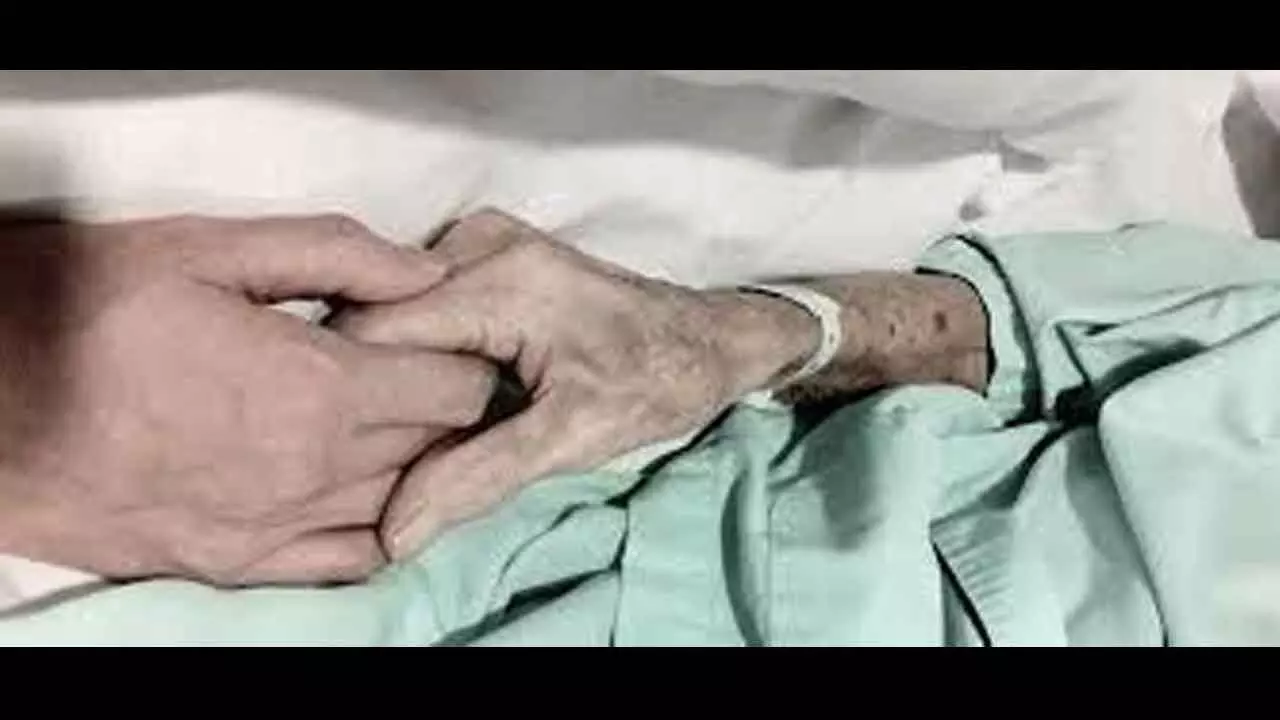Live
- UP bypolls: NDA leads in early trends, SP trails behind
- MVA stunned as MahaYuti heads to landslide win in Maharashtra polls
- Trends in Maha and J'khand a reflection of 'Modi magic': BJP
- Karnataka bypolls: Cong leading, celebrations in Channapatna; BJP concedes defeat in Sandur
- India-EFTA trade pact to drive $100 bn investment, boost 99.6 pc of exports
- Karnataka bypolls: Cong leading in all 3 segments, Kumaraswamy’s son trails by 18,029 votes
- MahaYuti bounces back in Vidarbha after dismal show in Lok Sabha polls
- Priyanka Gandhi will win with huge margin, says Telangana CM Revanth Reddy
- Three paramedics killed in Israeli airstrike on Lebanon
- 321 arrested in Tunisia for drug trafficking, criminal offences
Just In
Parents seek euthanasia for son; difficult, says SC


Court was considerate of the fact that the man has been in a vegetative state for 11 years after he suffered a fall from the fourth floor of a building and his old parents are finding it difficult to sustain the life through treatment as they have even sold their house
New Delhi: Describing the case as a “very hard one”, the Supreme Court sought the Centre’s response on Tuesday on a plea of a couple whose 30-year-old son has been lying in a vegetative state in a hospital since 2013 after suffering head injuries.
The court said instead of allowing passive euthanasia, which is not permissible in the case, it will explore the possibility of shifting the patient to a government hospital or a similar place for treatment and care. It agreed with the findings of the Delhi High Court, which had refused to constitute a medical board to consider the parents’ plea that their son be allowed to undergo passive euthanasia.
Passive euthanasia is the intentional act of letting a patient die by withholding or withdrawing life support or treatment necessary for maintaining life. A bench comprising Chief Justice D Y Chandrachud and Justices J B Pardiwala and Manoj Misra said the patient, Harish Rana, is not on ventilator or other mechanical support to sustain life and rather, was being fed through a food pipe and hence, no case was made out for passive euthanasia.
The court was considerate of the fact that the man has been in a vegetative state for 11 years after he suffered a fall from the fourth floor of a building and his old parents are finding it difficult to sustain the life through treatment as they have even sold their house. The bench was of the view that the parents’ plea that a medical board be set up to consider passive euthanasia for Rana was rightly rejected by the high court as no medical professional will cause death by injecting some substance into a patient who is alive without any mechanical or ventilator support.
“The high court held that passive euthanasia is not permissible as per the Common Cause judgment (of the top court) and that the person was not kept alive mechanically and was alive without external life support. We are in support with the view of the high court and the case does not fall under the ambit of passive euthanasia since there is no external life support,” the bench said. “At the same time, the court is mindful that the parents are now aged and cannot care for their son who is bedridden for so many years and if any humanitarian solution can be found other than passive euthanasia.
Thus, we issue notice to the Centre and request Additional Solicitor General (ASG) Aishwarya Bhati to assist us. We will see if he can be placed somewhere else. This is a very hard case,” the bench said. Later, the bench asked Bhati, who was appearing in the court in another case, if there was any possibility to lodge Rana at a hospital where he could be taken care of. “I will look into it. I will take the details and assist the court,” the law officer said. In July, the high court refused to refer Rana’s case to a medical board for allowing him to undergo passive euthanasia.

© 2024 Hyderabad Media House Limited/The Hans India. All rights reserved. Powered by hocalwire.com






